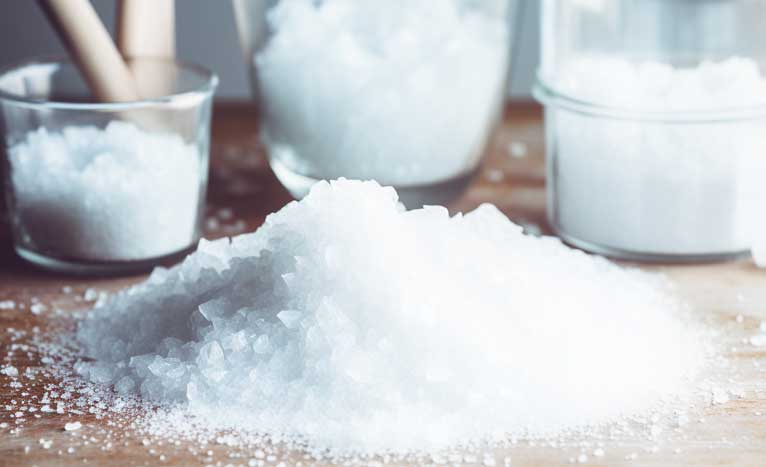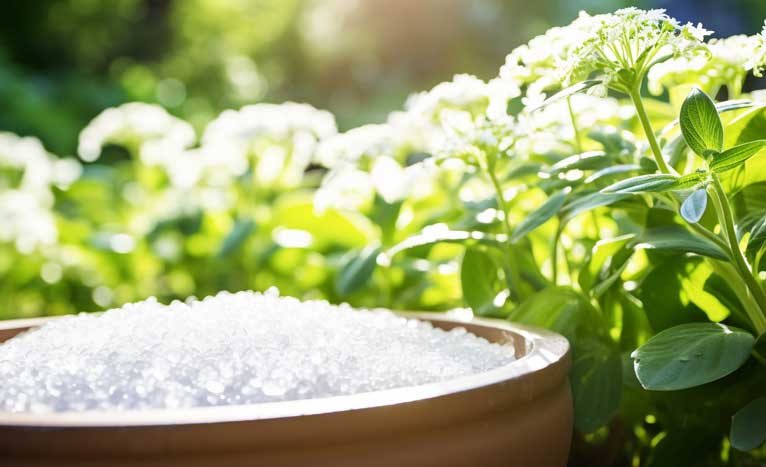If you're a gardener or a plant enthusiast, you've likely heard of Epsom salt as a potential addition to your plant care routine. Epsom salt, chemically known as magnesium sulfate, has gained popularity for its purported benefits in promoting plant growth and health. However, like any gardening practice, there are both pros and cons to consider. In this blog, we'll delve into the advantages and disadvantages of using Epsom salt for plants.
During this year’s garden, I would regularly stroll through my garden to see how it was doing and where I could improve. Epsom salt became a regular part of my plant care routine. Let’s dive in

What is epsom salt?
Epsom salt, originally discovered in the waters of Epsom, England, has been used for centuries for its therapeutic and agricultural properties. In recent years, its potential benefits for plants have sparked interest among gardeners and farmers. It has taken the garden community by storm, and I for one, love natural remedies that don’t involve harsh pharmaceutical chemicals being added to my food and garden!
Check out the Epsom salt I use HERE
Understanding Epsom Salt
Epsom salt is a naturally occurring mineral compound of magnesium and sulfate. Magnesium plays a crucial role in photosynthesis, enzyme activation, and overall plant metabolism. Sulfate, on the other hand, aids in the absorption of essential nutrients from the soil. When used in appropriate quantities, Epsom salt can provide these nutrients to plants.
Pros of Using Epsom Salt for Plants
Enhanced Nutrient Uptake
Epsom salt can facilitate the absorption of vital nutrients such as nitrogen, phosphorus, and potassium. This improved nutrient uptake can lead to healthier foliage, vibrant blooms, and more robust root development.
Improved Plant Growth
Plants supplied with sufficient magnesium exhibit improved growth patterns. They often develop stronger stems and branches, ultimately enhancing their ability to support heavy fruits or flowers.
Pest Deterrence
Magnesium-deficient plants are more susceptible to pests. By addressing magnesium deficiency through Epsom salt application, you can indirectly help protect your plants from certain pests.
Correction of Magnesium Deficiency
Epsom salt is an effective remedy for magnesium deficiency, which can manifest as yellowing leaves with green veins. Applying Epsom salt to the soil can rectify this issue and restore the plant's health.
I noticed this with my tomatoes mid-season in my garden. I worked Epsom salt into the soil in half of my tomatoes with yellowing leaves and noticed that they regained color and vigor compared to the plants I did not apply it to.
Cons of Using Epsom Salt for Plants
Risk of Over-Fertilization
While magnesium is essential, excessive application of Epsom salt can lead to over-fertilization. This can disrupt the nutrient balance in the soil and harm plant health. I would encourage you to get regular soil tests to ensure optimal health of your soil.
Impact on Soil pH
Epsom salt has a neutral pH, which makes it less likely to drastically affect soil acidity. However, repeated and excessive use can potentially alter the pH over time. Soil test. Soil test. Soil test! A soil test will tell you the deficiencies you are facing and what amendments you need to be making to your soil.
How to Use Epsom Salt Properly
To avoid overuse and its associated problems, apply Epsom salt in moderation. A diluted Epsom salt solution can be sprayed onto leaves or added to the soil during the growing season.
Tips for Maximizing Benefits
Conduct a soil test to determine magnesium levels before application.
Combine Epsom salt with other fertilizers for balanced nutrition.
Follow recommended dosage instructions provided by experts.
Case Studies: Success Stories and Failures
Numerous gardeners have reported positive outcomes after using Epsom salt, but there are also instances of negative effects due to improper application. Learning from real-life experiences can help you make informed decisions.
Before applying to my garden, I read extensively about its use and was intrigued. I truly don’t like to resort to chemical solutions if there is a natural alternative. If I spray my food with toxic pharmaceuticals, what is the point of having a garden? I think everything has a natural remedy and Epsom salt is a great solution for many gardening problems.
Expert Recommendations
Horticulture experts suggest that Epsom salt should not be solely relied upon as a plant growth booster. It's best used when a magnesium deficiency is confirmed through soil testing.
FAQs
Is Epsom salt suitable for all types of plants?
Epsom salt can be beneficial for many plants, but it's crucial to research specific plant needs before application.
Can I apply Epsom salt directly to the leaves?
Yes, you can create a diluted spray and apply it to the leaves, but avoid excessive use. I would suggest using a light mist and not drenching your plants.
How often should I use Epsom salt in my garden?
Frequency of application depends on the specific needs of your plants and the magnesium levels in your soil.
Can Epsom salt completely replace other fertilizers?
No, Epsom salt should complement a well-balanced fertilizer regimen rather than replace it entirely.
Where can I purchase Epsom salt for gardening?
Epsom salt is readily available at garden centers, pharmacies, and online retailers.

